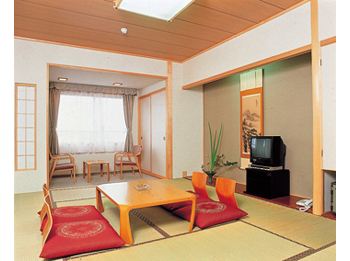(单词翻译:单击)
情景对话
Warren: So Antoinette, you've been living in Japan for a while now, right?
沃伦:安托万内特,你已经在日本生活一段时间了,对吧?
Antoinette: Yes, that's right.
安托万内特:对,没错。
Warren: Well, can you tell me, do you like to use chopsticks or forks and knives more?
沃伦:我想问你,你现在更喜欢用筷子还是更喜欢用刀叉?
Antoinette: It depends on what I'm eating really. For the most part, I enjoy using chopsticks. They are easy to use. I don't have to worry about cutting anything. And especially if I'm eating Japanese food, which tends to be chopped in small pieces, small bite-size pieces, chopsticks are perfect. But when I'm eating Western food or spaghetti, I prefer using Western style utensils.
安托万内特:这取决于我在吃什么。大多数情况下,我喜欢用筷子。筷子用起来很方便。我不用担心切到东西。尤其是在吃日本食物的时候,日本食物一般会切成小块,大概一口大小,非常适合用筷子。不过在吃西方食物或意面的时候,我更喜欢用西式餐具。
Warren: Oh okay, that makes sense. What about sleeping, do you like to sleep on like a Western bed or a Japanese futon?
沃伦:哦,好,有道理。那睡觉呢?你是喜欢睡在床上还是睡在日式床垫上?
Antoinette: Actually, it depends on the season.
安托万内特:这要看季节而定。
Warren: Why is that?
沃伦:为什么?
Antoinette: Well, in summer, I prefer sleeping on a futon. It seems cooler than a bed. But in winter, I love a cozy, plush bed with lots of pillows and quilts or duvets. And yeah, I like to feel cozy.
安托万内特:夏天我喜欢睡在日式床垫上。因为日式床垫好像比床要凉爽一些。不过冬天我喜欢睡在温暖舒适的床上,上面要有很多枕头和被子。我喜欢舒适的感觉。
Warren: That sounds nice. Okay. How about having shoes on or off in the house?
沃伦:听起来不错。好。那你在房间里穿鞋吗?还是会脱掉鞋?
Antoinette: Hmm, I like to go barefoot – well, with socks. My feet get cold.
安托万内特:嗯,我喜欢光脚在房间里走动,当然要穿袜子了。不然我的脚会冷的。
Warren: Well, do you use slippers?
沃伦:嗯,你穿拖鞋吗?
Antoinette: No.
安托万内特:不穿。
Warren: Okay.
沃伦:好的。
Antoinette: I find slippers uncomfortable unless they are the kind that fit your foot. They're not actually the correct size for my foot.
安托万内特:我感觉,如果拖鞋不合脚的话,穿着非常不舒服。拖鞋的尺寸不符合我脚的尺寸。
Warren: Oh, I see. So Japanese slippers are a different size from you.
沃伦:哦,我明白了。日式拖鞋的尺寸不适合你。
Antoinette: They are one-size fits all and I just feel like kicking them off anytime.
安托万内特:他们只有一种尺寸,我穿着的时候感觉随时会把鞋踢掉。
Warren: Right. Okay. How about, you know, in Japan, a lot of times people sit on the floor, but you don't really do that very much in the United States. Do you like sitting in chairs or on the floor more?
沃伦:好。好的。在日本,人们经常坐在地板上,不过美国并不经常这样做。那你喜欢坐在椅子上还是坐在地板上?
Antoinette: I like both actually. Again, it depends on the season. The floor is so nice and cool in summer, and I like just feeling that coolness. But in winter, I want fabric underneath me, and I want cushions that tend to act – provide a barrier for cold wind.
安托万内特:两个都喜欢。我要再说一遍,这要取决于季节。夏天的时候地板很好,因为凉快,我喜欢那种凉爽的感觉。不过冬天的时候,我喜欢坐在垫子上面,希望坐垫能抵抗寒风。
Warren: Right, right. Eating out is a little different, too. I think in Japan, you tend to share all the meals that you have but maybe back home you usually just buy one meal.
沃伦:好,嗯。在外出就餐方面,两国也存在不同。我认为日本喜欢共享食物,不过在美国通常我们只买自己的饭。
Antoinette: That's true. Maybe I'm a germ-phobic American – I don't know. I like eating my own food. I don't like to share. If it's one huge serving plate that's meant for several people, then fine. But I like just having my own plate of food.
安托万内特:没错。也许我是有洁癖的美国人,我也不清楚。我喜欢自己吃自己的食物。我不喜欢分享食物。如果一个特别大的餐盘里装着几人份的食物,那我也可以接受。不过我喜欢吃饭的时候有自己的餐盘。
Warren: Oh, okay. There's one more. What about having a shower or a bath? I think in Japan, they usually have like a detachable shower-head and you can shower yourself before going into the bath. What do you prefer?
沃伦:哦,好。还有一个问题。沐浴或泡澡呢?日本一般用可拆卸的淋浴喷头,在进浴缸以前可以先冲洗一下。你喜欢哪种洗澡的方式?
Antoinette: Well, I like showers, either way as long as the water is hot. Whether it's detachable or not, as long as the water is hot, I like showers. And I like having water run down my body. That's a pleasant feeling. But I also like sitting in a hot tub of water but not for too long.
安托万内特:我喜欢淋浴,只要是热水,哪种都可以。无论是不是可拆卸的淋浴喷头,只要是热水就可以,我很喜欢淋浴。我喜欢水流过我身体的感觉。那种感觉非常舒服。不过我也喜欢坐在热水浴缸里,不过时间不会太久。
Warren: Well, what about the bathtubs because I think they are different sizes, aren't they?
沃伦:嗯,那浴缸呢?我知道日本浴缸和西方浴缸的尺寸不一样,对吧?
Antoinette: They are. I like the fact that Japanese baths allow you to sit in water up to your neck. But I also like the fact that Western style baths allow you to recline in the water.
安托万内特:没错。日本浴缸,你坐进去以后,水可以到你的颈部,我喜欢那种感觉。不过我也喜欢西方的浴缸,因为我可以斜躺在浴缸里。
Warren: Right. You can stretch out more.
沃伦:对。可以伸展身体。
Antoinette: So you can stretch out, yeah.
安托万内特:没错,可以伸直身体躺在浴缸里。
Warren: Oh, okay. I see.
沃伦:好的,我明白了。
Antoinette: That's a hard call.
安托万内特:很难选择。

译文属可可原创,仅供学习交流使用,未经许可请勿转载
重点讲解
重点讲解:
1. for the most part 大部分;多半;通常;
例句:The contributors are, for the most part, professional scientists.
投稿者大多是专业科学家。
2. make sense 可以理解;讲得通;
例句:It made sense for Sam to live near the college.
萨姆住在学校附近是有道理的。
3. kick off 踢掉(鞋);
例句:he stretched out on the sofa and kicked off her shoes.
她四肢平摊躺在沙发上,踢掉了鞋子。
4. as long as 只要;
例句:I reckon we're safe as long as we keep mum.
我想只要咱们守口如瓶,就可保安然无恙。
5. stretch out (使)伸直身子躺下;
例句:The jacuzzi was too small to stretch out in.
这个“极可意”浴缸太小了,躺不下。


